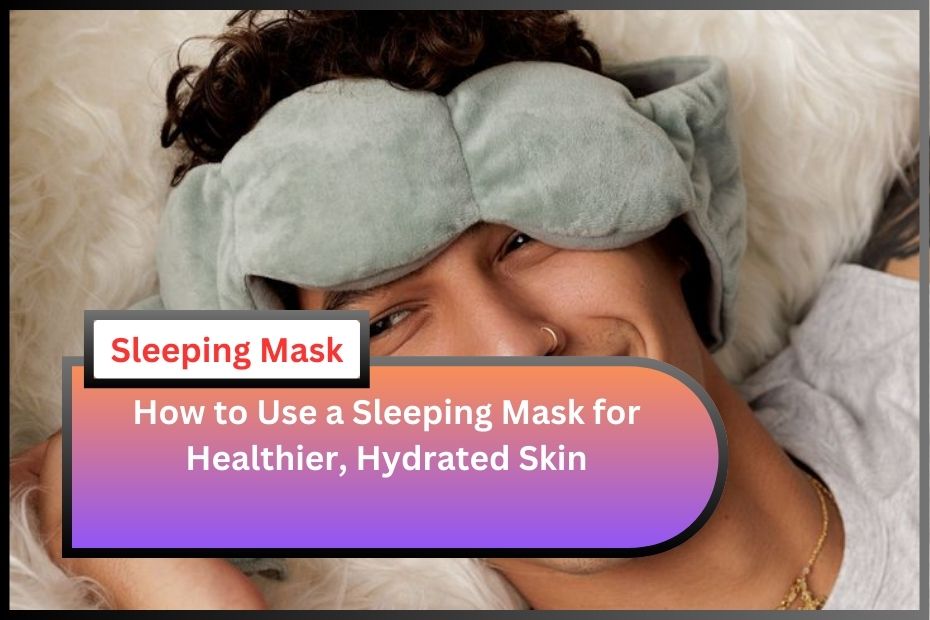If you’re someone who takes care of your skin, you’ve probably tried a facial moisturizer and even a facial mask to keep your skin smooth and hydrated. But recently, there’s a new trend that’s been growing in popularity: overnight sleeping masks. While this might sound strange at first, it’s becoming a favorite among skincare lovers. Let’s dive into what a sleeping mask is, why you might want to try it, and how to use it effectively.
What Is an Overnight Sleeping Mask?
An overnight sleeping mask is a special type of skincare product that you apply before going to bed and leave it on overnight. Unlike regular face masks, which you wash off after a set amount of time, sleeping masks are designed to stay on your skin while you sleep, working their magic throughout the night.
These masks are often made of thicker formulas, but they’re not as heavy as night creams. They help to lock in moisture and are filled with beneficial ingredients like hyaluronic acid and retinol that give your skin extra hydration and help with skin repair while you rest. Even though they have a thicker texture, they don’t clog pores, allowing your skin to breathe. Think of them as a powerful moisturizer for your face that works overtime while you sleep.
Why Use a Sleeping Mask?
You might be wondering, “Isn’t a regular moisturizer enough for my skin at night?” While a regular night cream does hydrate your skin, sleeping masks offer extra benefits. They often contain strong antioxidants and higher concentrations of active ingredients that can provide better results than regular moisturizers.
For example, sleeping masks often include ingredients like hyaluronic acid for hydration, or retinol for boosting skin renewal. These ingredients can work wonders overnight, helping your skin look fresher and more vibrant by morning.
They’re also great at locking in your serums and other skincare products that you applied earlier in the night, making sure they penetrate deeply into your skin. Although these masks are powerful, they are usually lighter than night creams, leaving less mess on your pillow.
How Does a Sleeping Mask Benefit Your Skin?
When you sleep, your skin naturally starts to repair and rebuild itself. This is the perfect time to support your skin’s natural process with the help of a sleeping mask. Sleeping masks boost your skin’s ability to repair itself, giving it added moisture and nutrients to help it look more glowing and smooth by morning.
The best part is, not all sleeping masks are the same. There are different types for different skin concerns. For example:
- If you have dry skin, a mask with ceramides and argan oil might be best.
- If you’re worried about acne, look for masks with hyaluronic acid, which hydrates without clogging pores.
How Should You Use a Sleeping Mask?
A sleeping mask isn’t meant to replace your regular night cream. Instead, it’s more of a special treat for your skin, used once or twice a week. Overuse of sleeping masks can actually reduce their effectiveness, so it’s important to use them sparingly.
Here’s how you should use a sleeping mask:
- Start by washing your face and applying your usual skincare products, such as serum, moisturizer, and facial oil.
- If your products don’t contain silicones (which create a barrier), apply the sleeping mask last.
- Let the mask absorb overnight, and wash your face in the morning as usual.
- Enjoy the extra hydration and the soft, glowing skin you’ll wake up to!
Popular Sleeping Masks to Try
Here are a few sleeping masks to consider if you want to give them a try:
- Allies of Skin Bright Future Sleeping Facial
- This mask is perfect for tired, dull skin. It contains glycolic acid, lactic acid, and hyaluronic acid to brighten and hydrate, as well as a gentle form of retinol to reduce fine lines.
- H2O+ Beauty Infinity+ Overnight Wrinkle Reducing Mask
- If you want to reduce fine lines and improve your skin’s texture, this mask is a great choice. It contains micro tripeptide and camellia japonica oil to improve elasticity.
- Kora Organics Noni Glow Sleeping Mask
- This organic mask is all about hydration. It’s made with caviar lime, silver ear mushroom, and kakadu plum to keep your skin moist and glowing.
A Word of Caution
While sleeping masks are safe for most people, it’s always good to double-check with a dermatologist, especially if you use prescription skincare. Some ingredients in sleeping masks, like retinol or vitamin C, might not mix well with prescription products, so be sure to read the labels carefully.
Overusing strong ingredients can lead to skin irritation, so it’s important to use masks in moderation. The key is to find a balance that works for your skin type.
Conclusion
Sleeping masks are a great addition to your skincare routine if you want extra hydration and skin care benefits while you sleep. They are perfect for helping your skin recover overnight, especially when paired with the right active ingredients for your skin type. Just remember to use them sparingly to avoid irritation and maximize their effectiveness.
FAQs
What is a sleeping mask?
A sleeping mask is a special moisturizer applied at night that hydrates and nourishes your skin while you sleep.
How often should I use a sleeping mask?
Sleeping masks should be used 1-2 times a week, as they are too potent for daily use.
Can I use a sleeping mask with my regular skincare routine?
Yes, apply your usual skincare products before the sleeping mask, but avoid products with silicones.

